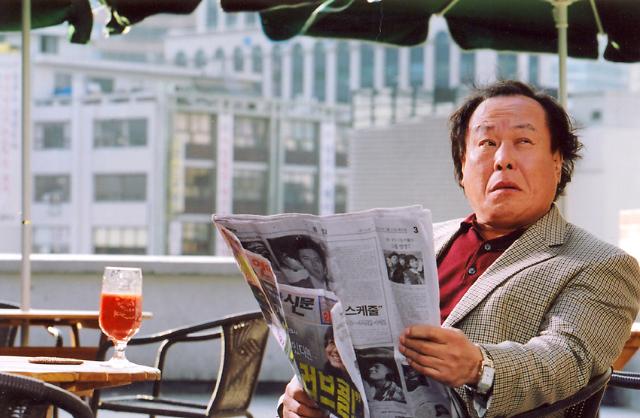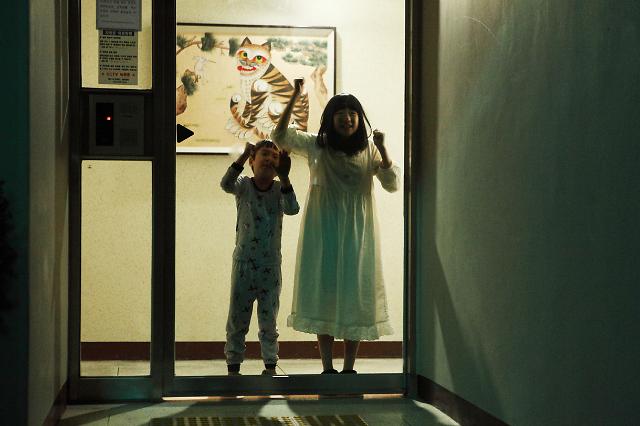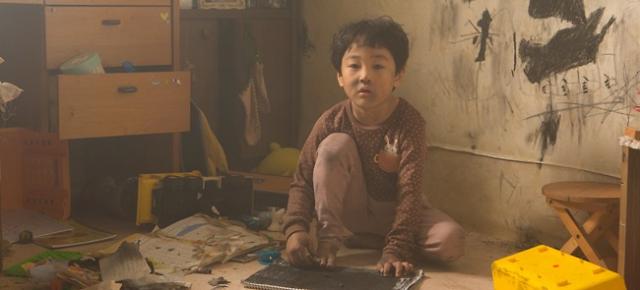130, Suyeonggangbyeon-daero,
Haeundae-gu, Busan, Republic of Korea,
48058
DATABASE
Ko-pick: Korean Omnibus Films
- Writer by KoBiz
- View1061
The omnibus film The Killers (2023) was
released in Korea in October after screening at festivals in Europe, North
America and Asia. It was invited to Fantasia International Film Festival,
Sitges Film Festival and the Busan International Film Festival after premiering
at the 23rd New York Asian Film Festival in July.
The genre anthology features four short
films directed by established filmmakers Kim Jong-kwan, Roh Deok, Chang Hang-jun
and Lee Myung-se. Inspired by Ernest Hemingway’s short story that has been
adapted into films before, the four different films Metamorphosis (Kim),
Contractors (Roh), Waiting for the Man (Chang) and Silent
Cinema (Lee) offer varying interpretations of the classic. It features Shim
Eun-kyung in all four films in different roles, while the cast also includes
Yeon Woo-jin, Hong Sa-bin, Oh Yeon-ah and Ko Chang-seok.
The film is especially notable for Lee
Myung-se marking his return to the big screen in Korea. The idiosyncratic
filmmaker famous for his films My Love, My Bride (1990), Nowhere to
Hide (1999), Duelist (2005) hasn’t had a film on theatrical release
since M in 2007.
Anthology films in Korea are not uncommon
reflecting the diverse range of styles and themes the industry has to offer. Sometimes
it gives filmmakers opportunities to collaborate together, while directors have
also made films featuring different stories adopting the omnibus format like Min
Kyu-dong with his debut All for Love (2005) or Jung Sik and Jung Bum-shik’s
Epitaph (2007).
Korea’s first anthology film was 7
Reasons why Beer is Better than a Lover (1996) directed by seven filmmakers
including Kang Woo-suk and Park Chul-soo. Other examples have included the If
You Were Me films that consists of seven anthologies, while the Horror
Stories series and Mad Sad Bad (2014) have also brought different
directors together.
This week we will profile some of these
titles starting with 7 Reasons why Beer is Better than a Lover before delving
into All for Love (2005), Epitaph (2007), Five Senses of Eros
(2009), the Horror Stories series (2012-2016), and Mad Sad Bad
(2014).
7 Reasons why Beer is Better than a Lover
Featuring seven parts helmed by Kim Yu-jin,
Jang Hyun-soo, Chung Ji-young, Park Chul-soo, Park Jong-won, Jang Gil-su and Kang
Woo-suk it centers on a man, Jonathan (Han Jae-suk) who returns to Korea from
America. Each episode – the first titled “Beer is Not Jealous even if I Drink
Beer” and the final part “There is No Obligation to Drink Beer for the Rest of
Your Life”– sees Jonathan date various women with beer, alcohol, and sex being
a running theme throughout much of the shorts.
In the first part, for instance, helmed by Kim
Yu-jin (Wild Card (2003), Jonathan meets a female CEO of a record
company while in the final episode that is directed by Kang Woo-suk, Jonathan is
pursued by a wig designer played by Bang Eun-jin after he turns to Soju instead
of beer. The anthology also stars Kim Ye-rin, Im Sang-hyo and Moon Soo-jin.
Although significant for being Korea’s
first anthology and it also sold 90,000 tickets in Seoul during the lunar new
year season, it was criticized by some in the industry and by viewers for its themes,
and for how it depicts women.

In Min Kyu-dong’s first feature as a solo
director (he made the horror film Memento Mori (1999) with Kim Tae-yong),
All for Love, he adopts an omnibus structure as it tells the different
stories of people living in Seoul over a course of a week – a newlywed couple (Im
Chang-jung, Seo Young-hee), a divorced father (Chun Ho-jin), his ex-wife (Uhm
Jung-hwa), an elderly women (Oh Mi-hee), a K-pop singer (Jung Kyung-ho), a cop
(Hwang Jung-min) and a debt collector (Kim Su-ro).
Akin to Love Actually (2003) that
has a passionate following in Korea often re-released during the Christmas
season, All for Love similarly draws audiences into these endearing stories
as the characters deal with different challenges in life; from debt and broken
families to illness.
Its touching stories connected with
audiences selling 2.5 million tickets making it the tenth most popular film of
2005.
Directed
by the Jung brothers (Jung Sik and Jung Bum-shik), Epitaph tells three
different stories as part of a wider narrative. Beginning in the late 1970s, we
see a doctor who learns that a hospital is being demolished and then recollects
his time at a hospital in 1942 where he worked as an intern. The young doctor
Jeong-nam (Jin Goo) falls for a young and beautiful dead woman who is lying in
the morgue, while also in the hospital is the sole survivor, Asako, (Ko
Joo-yeon) of a car cash that serves as the second part. The third story is
focused on a couple who work as surgeons at the hospital and get embroiled in a
series of killings of Japanese soldiers.
While
each story is distinct from each other, it is also cleverly formed as a feature
film making it one of the most significant horror films of the period. Richly
stylistic and genuinely frightening through its superb production design and
direction, it is also unique for the way it portrays the Japanese colonial era
capturing the complexities of the period.
The
film, released in the summer of 2007 – a popular time for horror films in Korea
as a way to cool off and beat the oppressive humidity – it was invited to
various film festivals including Seattle International Film Festival, Tallinn
Black Nights Film Festival and Fantasia Film Festival.
Five
directors who all graduated from the Korean Academy of Film Arts (KAFA) came
together to make different shorts for the omnibus Five Senses of Eros.
Each with his own style, tackles the themes of romance and desire in different
ways.
Byun-hyuk’s
His Concern centers on a man (Jang Hyuk) who meets a woman (Cha
Hyun-jung) on a KTX train on his way to Busan. Hur Jin-ho’s I’m Right Here
follows a couple played by Kim Kang-woo and Cha Soo-yeon dealing with
ill-health. Yu Young-sik’s 33rd
Man takes place on a film set and centers on two actresses (Bae Jong-ok and
Kim Gyu-ri) and their director (Kim Soo-ro). Min Kyu-dong’s In My End is My
Beginning features Uhm Jung-hwa and Hwang Jung-min as a married couple. The
wife discovers that her husband was having an affair with her high school
friend after he is killed in a car crash. Oh Ki-hwan’s Believe in the Moment
follows three couples who are close friends, and they decide to exchange
partners for a day.
Much
like the other shorts, it features high profile actors including Song Joong-ki,
Kim Dong-wook and Lee Si-young. Short films also do give directors more of an
opportunity to experiment with styles and themes and this is evident here.
Min Kyu-dong’s In My End is My Beginning was turned into a feature film and was released in 2013.

Min Kyu-dong was also a central figure in the Horror Stories series having been involved in all three omnibuses. The first, Horror Stories, starts with Beginning directed by Min Kyu-dong about a serial killer who kidnaps a high school student and she tells him about scary stories that are the subsequent shorts: Don’t Answer the Door by Jung Sik based on a Korean folktale The Sun and the Moon, Endless Flight by Lim Dae-woong that is set on plane, Secret Recipe by Hong Ji-yeong that draws its story of the lust between two stepsisters from the folktale Kongjwi and Patjwi, and Ambulance on the Death Zone by Kim Gok and Kim Sun that centers on an ambulance fleeing a zombie outbreak.
The film, which opened the Bucheon
International Fantastic Film Festival (BIFAN) in 2012, led to a sequel, Horror
Stories II, the following year with two of the directors returning: Min
Kyu-dong and Jung Bum-shik who helmed the first (444) and last films (The
Escape), respectively. Kim Sung-ho (The Cliff) and Kim Hwi (The
Accident) also were part of the project with their shorts.
It also screened at BIFAN, while also being
invited to the Sitges Film Festival and the Brussels International Fantastic
Film Festival where it won the Silver Raven Prize in the international
competition.
A third film was released in 2016 titled Horror
Stories III featuring four films: A Girl from Mars by Min Kyu-dong,
The Fox Valley by Baek Seung-bin, Road Rage by Kim Sun and Ghost
in the Machine by Kim Gok.

Mad Sad Bad
Action maestro Ryoo Seung-wan joined directors Han Ji-seung and Kim Tae-yong for the omnibus 3D project Mad Sad Bad (2014) produced by the Korean Academy of Film Arts (KAFA) that opened the 15th Jeonju International Film Festival in 2014.
Ryoo
Seung-wan’s Ghost is more of a character-driven story than many of his
action-packed features as it centers on a student who teams up with another
teenager to kill the boyfriend of a gamer. Han Ji-seung’s I Saw You
blends melodrama and K-zombies when a zombie falls for a factory manager after breakthroughs
in science have enabled humans to cure and exploit zombies by segregating them.
Kim Tae-yong’s elegant Picnic is about an 8-year-old girl who lives with
her seamstress mother and autistic brother.
While 3D never really took off as a premium format – at least compared to IMAX, Screen X and 4DX – Mad Sad Bad is an example how Korean directors have successfully utilized the medium of 3D.
Written by Jason Bechervaise
Editted by Shim Eun-ha




















